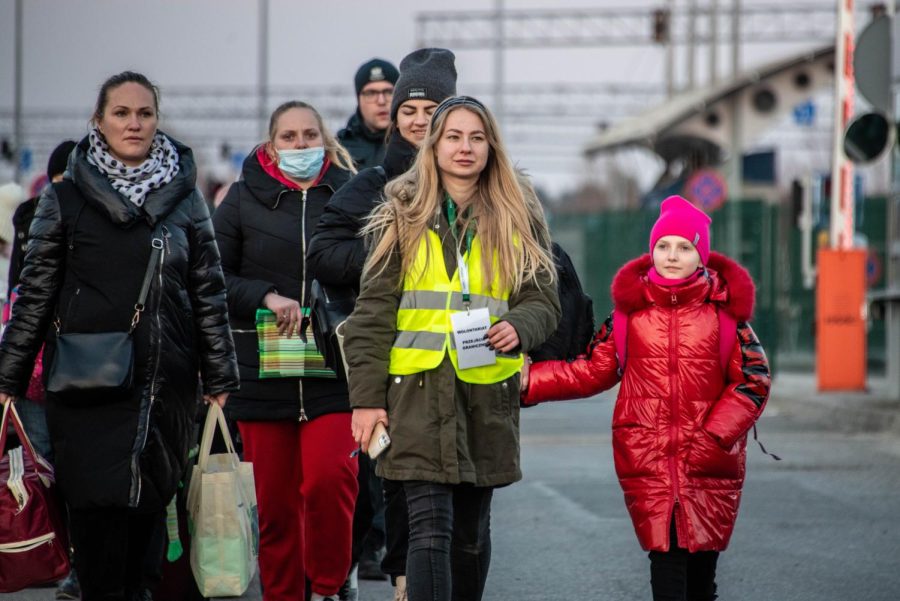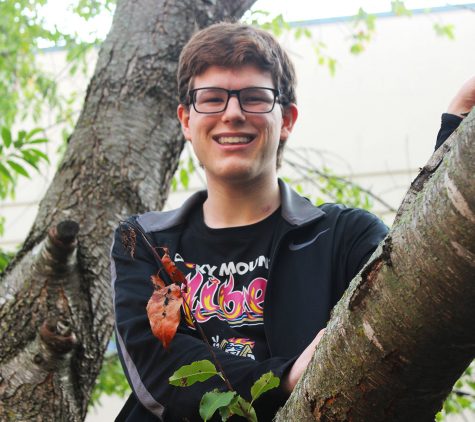Seeking Refuge
April 20, 2022
Of the 3 million Ukrainian refugees leaving because of the Russian invasion of Ukraine, many will find new homes in Missouri.
City of Refuge, a non-profit organization based in Columbia, has helped Ukrainians and refugees from other countries find access to the help they need in order to make the transition to the U.S. easier.
“[City of Refuge] helps refugees adjust to their needs in moving into new areas so that they can flourish as members of their new community,” Director of Development Dan Szy said. “We refer and connect the refugees to the needs they need and provide many other services beyond our own to work with them to better specify an individual’s exact needs.”
Szy says City of Refuge has worked with Ukrainians for a long time and the invasion hasn’t changed their mission.
“The conflict in Ukraine is not new,” Szy said. “In 2020, refugees from Ukraine gave us some of the highest rates moving in through City of Refuge, but we did receive more Afghans during the U.S. pullout of Afghanistan than we have received Ukrainians since the invasion started. But we are prepared for any potential influx we might get.”
A month after the invasion, the United States accepted 100,000 Ukrainian refugees into the country and donated $1 billion to help European countries deal with the surge of migrants leaving the country.
“The United States is prepared to commit more than $1 billion in humanitarian assistance to help get relief to millions of Ukrainians affected by the war in Ukraine,” President Joseph R. Biden said. “Many Ukrainian refugees will wish to stay in Europe closer to their homes. But we also will welcome 100,000 Ukrainians to the United States with a focus on reuniting families.”
The idea that many will stay in Europe and not head to the United States was reiterated by U.S. Press Secretary Jen Psaki, saying that the U.S. expects “that most, if not the majority, will want to go to Europe and neighboring countries,” while also saying that the U.S. will be “working with European countries on what the needs are [and] where there is capacity.”
With that all being said, the effect the invasion has on the state of Missouri is yet to be seen.
“The timetable for any resettlement of refugees is measured in years rather than months,” Szy said. “It takes years for someone to completely resettle anywhere in the U.S., so we won’t really see the statistics on where everything’s at for at least a couple of years in regards to how many refugees fully move into the area.”
Even so, City of Refuge is getting more opportunities to help refugees that are taking the first steps to become full U.S. citizens.
“We’re continuing to strive to increase our case load to give better starting blocks for those that need it and so it’s even more important to help those people out because a lot of them are losing everything because of the war,” Szy said. “The world doesn’t seem like it’s getting any more peaceful, so our job becomes a lot bigger.”
In terms of the 100,000 refugees the U.S. is letting in, there are many ways in which those refugees could gain access to the U.S. Some could be welcomed through the federal refugee program, while others could be handed visas or a form of “humanitarian parole” — a form of entry often given to people fleeing violence or war in countries around the world. However, as mentioned, many dealing with the issues expect that most Ukrainian refugees will want to stay in Europe, close to their homes.
“Most will end up staying in Europe,” Szy said. “So while we might not get the bulk of refugees in the U.S. or even in Columbia, our mission doesn’t change.”
In September 2021, President Biden put the maximum amount of refugee admissions from around the world to 125,000, but that number wasn’t even close to being accomplished before Ukraine, as there were only a few tens of thousands before the invasion, mostly coming from Afghanistan. Nevertheless, the announcement to allow 100,000 Ukrainian refugees increased the role of the U.S. in dealing with the humanitarian crisis. On a smaller scale, millions of Americans have helped the effort.
“Americans and American businesses can provide support for the Ukrainian people through monetary donations to humanitarian organizations working in Ukraine and in neighboring countries,” The U.S. State Department said in an email. “We applaud Americans who use their skills and energy to volunteer and assist non-governmental humanitarian organizations in the United States or abroad.”
Shawn Cockrum, the Director of Student Support Services at the Missouri Department of Elementary and Secondary Education, says that schools in Missouri will be up to the challenge of taking in however many refugees might come into the area and that there are programs throughout the department that aid in the transition to the U.S..
“[As Director of Student Support Services] I administer federal educational programs for students who are migrants, English learners, immigrants, refugees, homeless, living in foster care or are in correctional facilities,” Cockrum said. ”For some programs, we can provide help outside of school for things like eye or dental exams or school supplies.”
In terms of the current crisis in Ukraine, Cockrum says that communicating with school districts about what is happening is of utmost importance.
“Our main efforts right now revolve around keeping school districts aware of what is going on with refugee placements as we hear about them,” Cockrum said. “We receive reports about how many families are being placed in our state so we pass that along as we get it. Also, we are prepared to allocate additional funds or announce new grant opportunities as those are announced. I expect it will be a few months to a year before we see anything specifically for Ukrainian students.”
City of Refuge takes donations from the community to help with the effort of assisting refugees in the United States, wherever they come from.
“We continue to accept gifts in kind of items like clothing, hygiene products and household items that we turn around free of charge to meet refugees’ basic needs,” Szy said. “We rely on financial contributions that equip us to serve more refugees as they escape violence and persecution from conflict zones worldwide, including Ukraine.”







